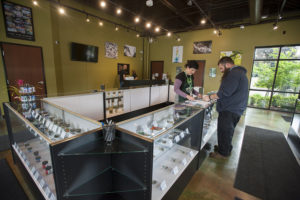Main Street Marijuana expands to three shops

One of the founders of Vancouver’s first retail recreational marijuana store can talk about his enterprise for more than 20 minutes without mentioning any of the many names for his products.
“We’re trying to get a regional presence,” said Adam Hamide, whose Main Street Marijuana now has locations on Main Street, in east Vancouver and in Longview. “We want to constantly beat our own prices. We’re always pushing ourselves and pushing others to compete.”
It’s clear the novelty has worn off for the nascent industry, and the legalization of marijuana sales in Washington state now comes with all the opportunities and growing pains of any other business.
For Hamide, the new store at 16219 S.E. 12th St. Suite 104 that opened May 15 unlocks a new market for Main Street Marijuana, providing greater access for existing customers and enticing new ones on the east side of the county.
“Stores are clustered downtown,” Hamide said. Other than The Herbery down the street at 212 N.E. 164th Ave., “there were no stores east of Lieser Road,” he said.
Both of the east Vancouver stores have sleek, open designs and more parking afforded by the newer retail spaces on that side of town; Main Street Marijuana opened its new shop in a former salon.
“It’s all for us to win customers over,” Hamide said.
Opening shop out east may also help win over some of the neighbors who say the business is creating problems in its original Uptown Village neighborhood.
“The traffic congestion and noise from the constant in-and-out traffic of their customers goes on all day,” said Renee Soasey, who started a petition to limit the hours of the store, which Vancouver’s planning commission panned. “Many customers park illegally and leave their engines idling and their radios blaring while they run into the store.”
She said having the store close at 8 p.m. — it’s now open until 11 p.m. — would cut down on the noise of customers who show up in “party mode.”
“This is a mixed-use neighborhood, and it cannot bear the volume of business, particularly in the late evening hours,” Soasey said.
Hamide estimates he gets about 2,000 customers a day at the Main Street store, though just five parking spots serve them. With a new location out east, he said those customers who “make the drive for the prices” — anywhere from 5 percent to 20 percent of daily visitors — may now be less of a burden on Uptown.
“Most communities would be happy to have a parking problem,” Hamide said. “That means business is thriving.”
Though the east-side shop has plenty of parking and could alleviate some Uptown traffic, the Main Street location is also looking to expand its footprint, absorbing 600 square feet next door to the existing 900-square-foot space. That proposal is pending city and state Liquor and Cannabis Board approval, but Hamide said he expects to move in late this summer.
With nearly 100 employees over three locations, Main Street Marijuana leads high-grossing rivals New Vansterdam, High End Marketplace and The Herbery in terms of monthly sales. In April, the Main Street location had $1.6 million in sales, according to state data, while it also passed the $10 million mark in total excise and sales taxes paid to the state since opening in summer 2014.
“We didn’t expect things to be this successful,” Hamide said, “but we’re not surprised anymore, based on prices, selection and customer service.”
Since stores in Washington started opening in July 2014, nearly $800 million worth of marijuana has been purchased by consumers, bringing in more than $200 million in excise taxes.
Plenty of Oregonians have been supporting Clark County’s nine retail marijuana stores and adding to Washington state coffers. That much was obvious when those stores’ revenues tanked in October as the Beaver State allowed some stores to start selling recreational marijuana — tax-free.
In September, the county’s stores reported nearly $5 million in sales. The next month bottomed out to around $3 million, but in April, the Clark County market showed recovery with close to $3.5 million in sales.
Another sales hit could be imminent, given the rollout of edible and concentrate products in Oregon this summer. But Hamide said local stores will weather the competition.
“Their system is going through the same growing pains as the state of Washington’s did,” he said.
Local stores won’t, at least, have to worry about competition from three new stores opening in Vancouver after the city council this week put the kibosh on that planning commission recommendation. But like so much else in the young cannabis economy, that could change.
“In five years from now, the market will be more mature,” Hamide predicted. “And that’s a benefit for the consumer. All that will be left is a network of the best stores and growers.”
